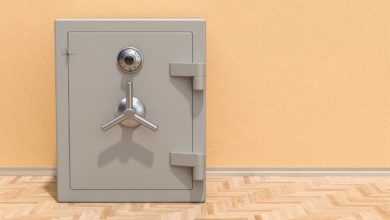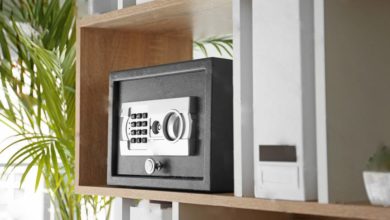Should You Get A Fire Proof Wall Safe?
KEY TAKEAWAYS
If you have your own home, you must go to great lengths to keep your home safe and secure. Have you installed door security alarms and outdoor motion sensors? Have you added a home security alarm system and even spotlight security cameras to monitor your house while you’re away?
Like many homeowners, you may want additional protection for the valuables in your home. Wall safes are an excellent one to add to your home security plan. A good wall safe can protect your jewelry and cash from fire and prevent losing them from burglary.
Continue reading the article below to find out whether you should get a fire proof wall safe for your valuable items.
What To Consider When Buying A Fire Proof Wall Safe
For many people who purchase a wall safe, keeping it out of sight is almost as important as keeping the contents secure. A wall safe, which sits between a building’s framing studs, is shallow and can be concealed by hanging a painting over it. To select the best fireproof wall safe, consider important factors like:
Wall Safe UL Ratings
Underwriters Laboratory (UL) gives some safe models an independent rating. UL-rated products will have the letters “UL” inside a circle. Here are a few of the UL ratings specific to wall safes:
- Class 125: Heat resistant of up to 1,550 °F; interior remains 125 °F or less for one or two hours.
- Class 150: Heat resistant of up to 1,550 °F; interior remains 150 °F or less for one or two hours.
- Class 350: Heat resistant against temperatures reaching 1,700 °F; interior remains 350 °F or less for 30 minutes up to 2 hours.
A Class 350 fire rating is ideal for securing important paper documents like passports and birth certificates. Also, some wall safes that underwent fireproofing are known to be waterproof.
Accessibility And Locking Mechanism
Wall safes are available with four different types of locks, each with benefits and drawbacks. Consider which type of lock best meets your home office’s security requirements:
- Biometric. This type of locking mechanism utilizes a fingerprint or retinal scan to open the safe.
- Combination lock. This lock uses a preset combination programmed via spinning the dial once or twice.
- Numeric keypad. A numerical keypad, which is common on many modern safes, requires the user to enter a four- to eight-digit code in sequence.
- Manual key lock. Sometimes the only lock on a wall safe is a keyed lock, which requires a physical key to open the safe.
Material And Quality
The majority of modern wall safes are made of heavy-gauge steel and steel alloys. The exterior steel structures are often powder coated to reduce the risk of rust and corrosion.
The strength of a wall safe’s locking mechanism and its construction materials determine its quality. When selecting a safe, carefully consider these factors.
Size And Capacity
Because residential construction standards limit the width and depth of the space in which they sit, wall safes are typically quite small. The standard residential stud spacing is 16 inches from one stud to the next, leaving only 14.5 inches of space between the studs. The stud space’s depth will be either 4 inches in a 2×4 wall or 6 inches in a 2×6 wall, making wall safes relatively shallow.
Additional Features
Wall safes with digital memory cards that record every attempt to open the safe are now available, as well as safes that sound an alarm if an unauthorized person tries to access it. Others may include interior lighting to allow the user to retrieve valuables in the dark or a silent mode to allow them to open the safe without the usual beeps made by a digital pad.
Benefits Of Fire Proof Wall Safe
Built-in home safes are now frequently used by most homeowners to secure their valuable possessions against thieves, fires, and floods. Here are some of the major benefits of owning a fire proof wall safe:
- Easy To Conceal. A wall safe is much easier to conceal than a floor safe. It is also more secure against burglars and home invaders as it is hidden from plain sight.
- Quick Access. Simply enter a code or scan your fingerprints to open a safe, allowing you to reach your valuables easily.
- Increased Security. With pry-resistant doors and durable construction materials, you can rest assured that your valuable items are well protected.
- Space Conserving. Another great advantage of a wall safe is that it conserves space. Installing it in a closet or office keeps it out of high-traffic areas of your home.
Do you want reliable and easy-to-install security devices for your home? If so, check out this article from Security Forward on the best wireless motion sensor alarms for your home.

